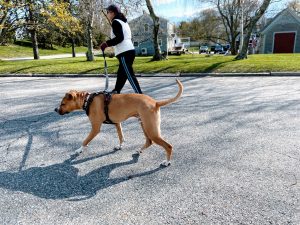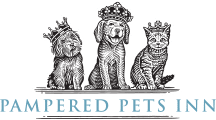 Leash reactivity occurs when a leashed dog exhibits behavior such as lunging, pulling, barking and/or growling at other dogs, people, or other triggers.
Leash reactivity occurs when a leashed dog exhibits behavior such as lunging, pulling, barking and/or growling at other dogs, people, or other triggers.
It’s important to understand how dogs communicate naturally in order to understand why dogs exhibit leash reactivity. Dogs typically first meet while giving each other space, circling around each other and sniffing to check out another dog before deciding if they get along and want to play, or if they do not and want to distance themselves. They greet each other from the side instead of head on and making direct eye contact.
Adding a leash into the mix complicates this process by restricting their movement, and forces dogs to meet face to face. They feel trapped, frustrated, and unable to escape a potentially threatening situation, causing them to react negatively through barking, lunging or pulling. It could also be aggravated by the lack of early socialization or a past negative walking experience.
The good news is that there are ways to help manage leash reactivity and keep a dog below his or her threshold of frustration so they don’t get so worked up seeing something that triggers them while on leash.
- Practice getting your dog’s attention and focus on you. Reward them for looking at you when you call their name with treats or praise. This will take time and practice. It’s helpful to start this before you’re in public around things that will cause distractions, then gradually move to busier environments.
- When on a walk, before another dog or person gets close, get their attention and reward them when you do. Continuing this method will help your dog associate this with treats and a positive experience, and eventually you can begin to decrease the distance from the trigger when you ask for their attention.
- Avoid punishing your dog by yelling or yanking the leash. This will cause your dog to get even more stressed and worsen the situation.
- Don’t get worked up or frustrated yourself. Dogs sense your anxiety and will feed off of the energy you put out. The key is consistency!
Want to continue working on leash manners with your pup? Our Training Team can help! Ask about our programs and how we can help your pup find training success!
